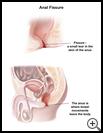
Anal Fissure
________________________________________________________________________
KEY POINTS
- An anal fissure is a small tear in the skin of the anus. The anus is the opening of the rectum where bowel movements leave the body.
- Most fissures will heal in a few days with at-home treatments such as soaking in a warm tub, using a stool softener or laxative medicine, and drinking a lot of liquids.
________________________________________________________________________
What is an anal fissure?
An anal fissure is a small tear in the skin of the anus. The anus is the opening of the rectum where bowel movements leave the body. Anal fissures are a fairly common problem.
What is the cause?
A tear may happen when you have:
- Hard, dry bowel movements
- Constipation
- Diarrhea (loose bowel movements or frequent wiping can irritate the anus)
- Hemorrhoids
- Anal surgery
- Inflammation of the rectum caused by intestinal problems such as Crohn's disease
- Some sexually transmitted diseases (STDs)
What are the symptoms?
Symptoms may include:
- Pain during or after bowel movements
- Cramping of the muscle at the opening of the anus caused by irritation of the tear during a bowel movement
- Bright red blood when you have a bowel movement. You may see the blood on the bowel movement, in the toilet water, or on toilet tissue you have used.
How is it diagnosed?
Your healthcare provider will ask about your symptoms and medical history and examine you. Tests may include:
- Rectal exam, which your provider does by looking at the skin around the anus and gently putting a lubricated and gloved finger in your rectum
- Anoscopy, which uses a small, lighted tube put into your rectum to look for hemorrhoids or other causes of bleeding
Your healthcare provider may recommend other tests or procedures to learn more about the cause of the fissure or the bleeding.
How is it treated?
Most fissures will heal in a few days with the following at-home treatments:
- Your healthcare provider may recommend a stool softener or laxative.
- Drink enough liquids each day to keep your bowel movements soft and your urine light yellow in color.
- Add more fiber to your diet to soften bowel movements by eating whole-grain bread and cereal, beans, bran muffins, brown rice, and fresh fruit and vegetables.
- For pain, your provider may recommend or prescribe use of pain-relieving cream or ointment, such as hydrocortisone or pramoxine, for a few days. Contact your healthcare provider for advice if you are using nonprescription pain-relieving creams or ointments for more than a few days. These products may cause allergic skin reactions and worsen your problem.
- Soaking in a warm bath 2 or 3 times a day may also help to relieve pain and keep the area clean.
- After bowel movements, gently wipe the area around the anus with clean, moist pads. This will remove irritating particles and fluid from the anal area.
For fissures that come back or do not heal, medicines can be put inside the anus to try to relax the muscles around the anus and allow the fissure to heal. If this does not help the fissure heal, you may need surgery.
How can I take care of myself?
Follow the full course of treatment prescribed by your healthcare provider.
Ask your provider:
- How long it will take to recover
- If there are activities you should avoid and when you can return to your normal activities, including sexual activity
- How to take care of yourself at home
- What symptoms or problems you should watch for and what to do if you have them
Make sure you know when you should come back for a checkup. Keep all appointments for provider visits or tests.
How can I help prevent anal fissures?
The best prevention for anal fissures is to keep your bowel movements soft and prevent constipation by:
- Drinking plenty of water
- Eating fresh fruits, vegetables and whole grains
- Exercising regularly

